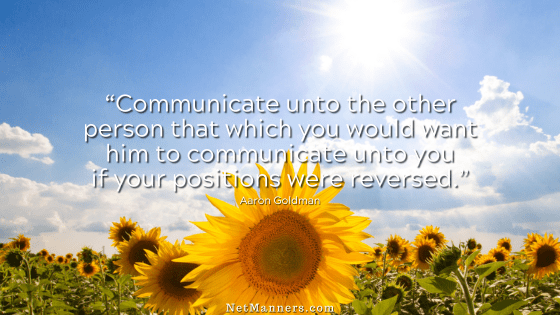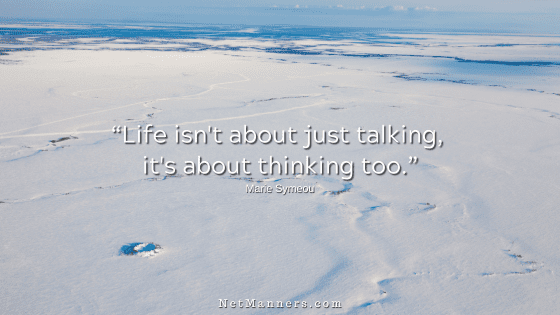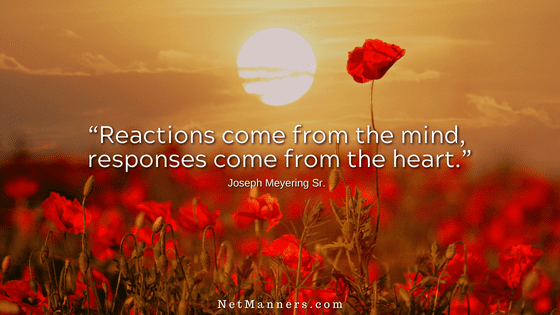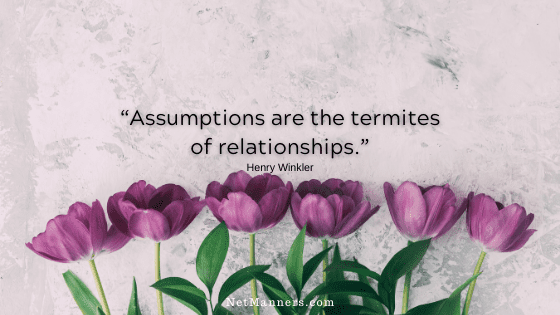No Email Response Can Be a Response

Every survey I take or when the topic comes up points to the fact that pretty much everyone’s pet peeve is a lack of response to emails. I talk about that a lot on this site.
But then today, I was thinking… besides the obvious reasons—being busy, address typos, and emails landing in spam/junk/trash—there is another reason why you may not get a response to your emails.
How you email.
Every so often, I get an email that makes me shake my head in disbelief. I read it and think that if someone spoke to me in person, in that way, I would have a hard time not reacting.
So, today, let’s discuss the reality of not using email etiquette in your online communications, including the fact that email etiquette applies to website contact forms and social media communications. How you choose to email and communicate with the written word certainly can impact when or even if you will get a response.
Think about it… Those who don’t consider courtesy when communicating online probably wouldn’t say the same thing, at least not the same way if they were face-to-face. These emailers do not realize how demanding or terse their message “sounds.”
In person, they would most likely make extra efforts to prevent that from happening—some, as we have all experienced, do not. So it goes without saying that how you communicate says something about you.
No Courtesy; No Reply?
My natural inclination has always been to reply to everyone who emails me. I take the opportunity to share my POV and always want to help. I double-check that I’m not overestimating the tone and intent.
After several decades, I can confirm that this approach is not prudent or productive. Sending a demanding email that shows no concern or respect for their time, experience, knowledge, or even what they are available to offer is a huge red flag.
I no longer respond to emails that show no effort at courtesy. When folks do not try to add courtesy to their communications, why should the onus be on me to “show them the light?” especially when they make little effort to communicate as educated adults.
Website owners are increasingly taking this stance too. Visitors fill their inboxes with requests, demands, typos, and poor grammar. Yes, if it is an established customer, it is best to reply while reflecting professionalism. But what about “first contacts”?
Why encourage relationships with those who make inaccurate accusations or demands impossible to accommodate? You can’t help but wonder what it would be like to communicate regularly with someone who communicates that way.
No Email Etiquette Probably Not a Friend or Good Customer
A lack of basic email etiquette courtesies is a sure sign that you will be a needy friend or demanding customer to serve. I’ve had that very thought for some inquiries through my business website. I just know there won’t be any synergy. (This is where my thirty years of experience comes into play.)
What happens if someone contacts you telling you how they expect you to do your job, reflecting little knowledge of what is involved? They explain what they are willing to pay (again, without understanding what is involved). All the while making unreasonable demands on your time (I need this ASAP).
I’ve used email for decades and know the warning signs. My gut instinct often raises a “red flag” based on how an email is structured. I listen to my gut because I have learned the hard way.
Don’t be a red flag. You don’t want those you want to form online relationships with, or do business with, to decide you could be a PIA. All because you refrain from using email etiquette in your communications. Something so simple to do.
Stand Up and Stand Out
Today, we depend on email more than ever. Our inboxes are increasingly filled with messages that need our attention and take our time to respond. It is common sense to realize that not all messages warrant the time or are a priority for garnering a response.
For those who cannot email with “knowledge, understanding, and courtesy,” realize that you are possibly choosing to be ignored. On the contrary, communicate by integrating the basics, and others look forward to seeing you in their inbox.
How you communicate with those you don’t know can be even more telling. Most of us would rather spend our time responding to those who contact us in a way that lets us know that our time and advice will be appreciated. Being too informal, at first, can be a turn off.
That is why email etiquette is so important when emailing those you need help from or with whom you want to form relationships. These little courtesies, which are easy to integrate, allow your email to be viewed positively, increasing your chances of receiving a response.
Because if you don’t want to make these efforts, know that no response is probably a response.







